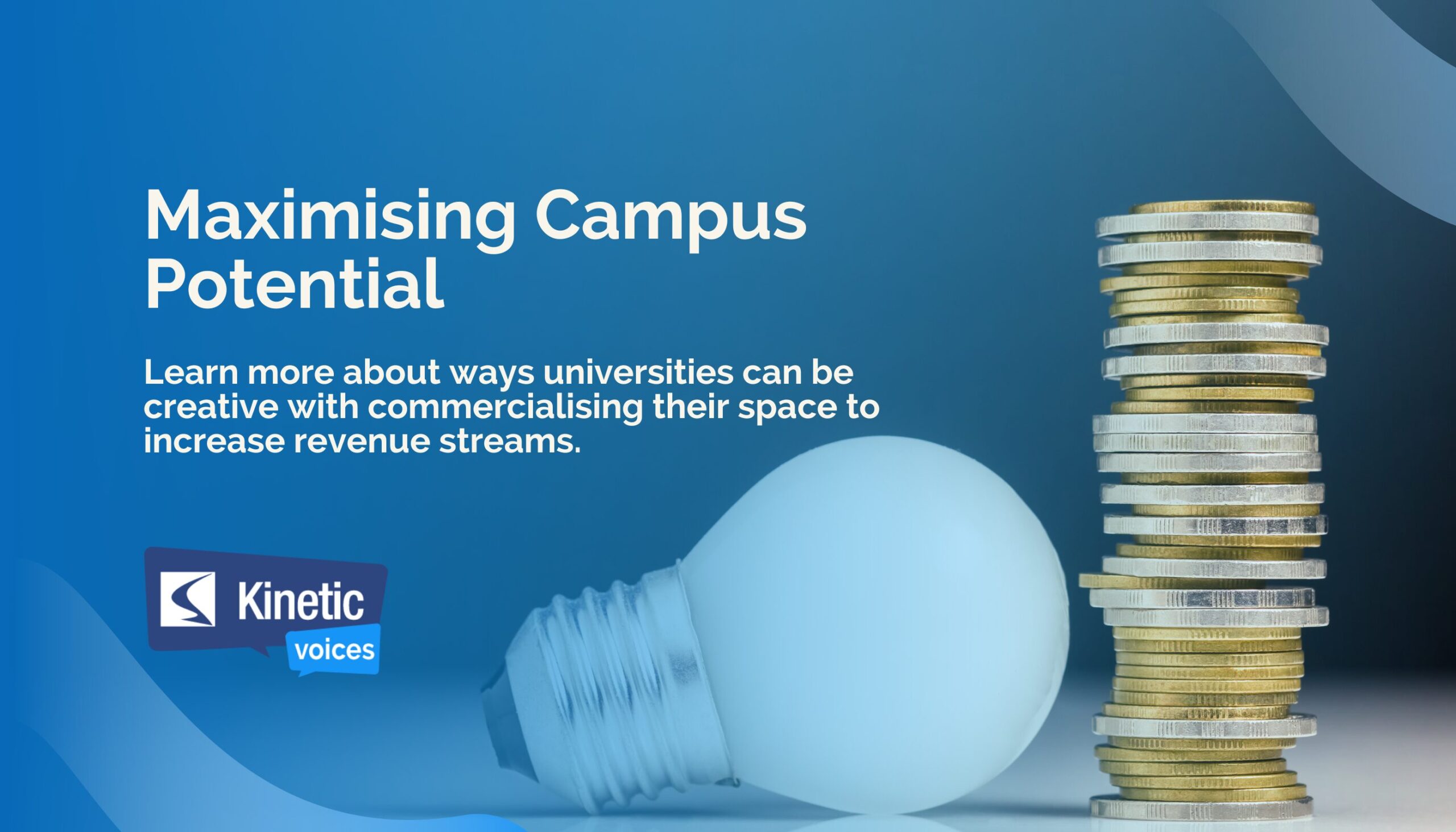Recent years have seen a seismic shift in how we work and live, and universities are no exception to this change. With more and more higher education institutions finding themselves at a pivotal juncture, they are re-evaluating their spaces amidst evolving demands. And as the traditional landscape of office and retail spaces transforms, academic institutions are uniquely positioned to innovate.
Join us as we explore five innovative strategies that showcase how universities can creatively commercialise their spaces, adapting to thrive in today’s dynamic environment.
The rise of hybrid working after the pandemic is having a huge impact on office life, with the Financial Times reporting that England’s stock of office space is now “falling at the fastest rate for 20 years”, with construction rates plummeting as businesses recalibrate to a new working world.
This, in turn, is having an undeniable impact on all kinds of retail spaces – and that includes those in universities. While unit closures and a changing retail landscape may feel negative, it needn’t be that way, says Jo Hardman, Director of Commercial Services at Lancaster University.
“The change in working practices and footfall is a challenge,” he says. “I’ve always maintained that staff were more significant for footfall around food and beverage than we acknowledged. Now it’s very, very clear that academic staff in particular are coming onto campus less than they used to and we’re seeing a reduction in the spaces used, but that does throw up potentially major opportunities to be smart about how you’re using your estate.”
– Jo Hardman
So what are some of the innovative approaches open to universities in this new era?
1. Coworking Spaces
Recent years have seen a boom in coworking – where staff work from a desk they hire for the day, week or month, alongside others doing the same – and experts predict that this trend is likely to continue. Jo points out that universities are perfectly poised to offer a service that can be head and shoulders above coworking competitors.
“As a university, if you’ve probably got a space that’s under-utilised, that could work really, really well for freelancers,” he says. “You could charge, say, £15 a day and provide an efficient coworking space.”
– Jo Hardman
The beauty of it, he continues, is that campuses already have everything coworkers look for, from high-speed internet to leisure facilities and retail.
“If you go into a city coworking space, you probably won’t have car parking as cheap as it is on campus, you won’t have a really good quality gym that you can use, and you may not have the beverage options,” he says.
“You’ve also got the whole cachet of working in a university around, engaged students, top academics and top thinkers. I think there are huge opportunities for businesses and freelancers.”
– Jo Hardman
According to Mat Oakley, Head of UK and European commercial research at estate agents Savills – writing in a blog for the Higher Education Policy Institute – the potential logistical challenges of running such spaces can be taken on by “an increasing number of companies which will ‘white label’ the space so that it appears that the university is the ultimate landlord, but they undertake all the mechanics of fitting-out, leasing and managing it”.
To streamline the process of managing and booking these coworking spaces, universities can utilise Customer Hub which offers a comprehensive solution for space booking, ensuring a seamless experience for both the university and the users. Explore how Customer Hub can help you efficiently manage your coworking spaces and attract a diverse range of users.
2. Hiring Out Other Assets
Rachael Lee is Membership Director at Academic Venue Solutions, a company that connects event organisers with academic spaces, and says that universities may have commercial opportunities hidden in plain sight.
“What’s coming to the forefront now is other assets,” she says. “There could be lots of things that universities own that they don’t necessarily think about. So laboratories, or even equipment could be utilised and sold. I know there are a couple of universities that have got flight simulators, for example, and there are lots of great opportunities like that.”
– Rachael Lee
3. Providing Locations for Film and Television
“Filming can be a huge income stream for universities, and the great thing is that it is a large surplus generator” Rachael continues.
Universities often boast remarkable buildings that can appeal to location scouts, she explains, and several institutions in the capital (such as Royal Holloway, the University of London and London Metropolitan), have all had theirs used recently.
“You can block out space for a defined period and it’s not a risk because the space is used, they come and they go, rather than having lots of people roaming around. So it’s a real double whammy in terms of income generation.”
– Rachael Lee
4. Summer Holiday Lets for Staycations
While universities often offer their accommodation out of term time to various organisations, they may be missing a trick in not marketing themselves to cost-conscious holidaymakers, Rachael proposes.
“Sometimes universities forget that there’s a huge market now in the staycation world, where you can very easily sell your bedrooms online,” she says. “There are some very quick wins there in terms of promoting your accommodation, particularly if you’re in a coastal or a tourist place.”
– Rachael Lee
To tap into this opportunity, universities can use our products, KxB&B and BedBooker. KxB&B allows universities to create a dedicated website for direct room bookings, while Bedbooker enables listing on major OTAs like Booking.com and Expedia. Check out these solutions to effortlessly let out your university properties for summer stays and attract the growing staycation market.
5. Offering Accommodation for Staff
Amanda Pettingill, Catering, Hospitality and Conferencing Director at the University of Nottingham, says that the creation of an annexe for staff accommodation has proved popular and profitable.
“We usually find staff need to stay over for so many nights a week, so in terms of the price point, they need it to be affordable,” she says. “There are about 14 rooms in one block, although I think there’s a greater need, particularly with people having hybrid working and living even further from work. It’s fairly full regularly now.”
– Amanda Pettingill
The Greater Good
When it comes to thinking about opening up university spaces and new and creative ways, Jo Hardman concludes, that universities should consider these new approaches as acts of “good citizenship” as well as good commercial sense.
“It means people will see the university as a space that they can use,” he says. “So it’s making money but it’s also driving engagement, and boosting reputation, giving people the things that are important to them.”
– Jo Hardman
As universities navigate the evolving landscape of higher education and commercial opportunities, the strategies discussed here highlight their adaptability and innovation in maximising campus spaces. By leveraging underutilised assets for coworking, event hosting, and even filming, institutions can not only generate revenue but also enhance their community engagement and reputation.
For those looking to explore further opportunities like offering accommodations and spaces commercially, check out KxB&B, BedBooker and Customer Hub. These products not only contribute to financial sustainability but also position universities as dynamic hubs capable of meeting diverse needs in today’s marketplace.
Discover how these approaches can transform your campus into a thriving, multifaceted environment that supports both academic excellence and commercial success.






